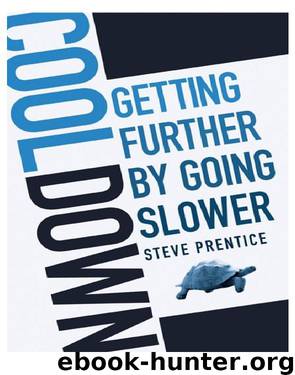Cool Down by Steve Prentice

Author:Steve Prentice
Language: eng
Format: epub
Publisher: Wiley
Published: 2010-03-21T16:00:00+00:00
Negotiation, in this scenario, as with all others, must always aim for the win-win. This is a language that all people understand, and when phrased correctly, they will be able to visualize how the results will benefit them.
Alleviating Confusion While Prioritizing or Multitasking
One final demonstration of the power of cooling down comes from the alleviation of confusion and stress when trying to prioritize multiple conflicting activities. This is a situation in which overload happens quickly, and the cost is great. In Chapter 5, in the section entitled, “I like Causing Creativity,” I used the unusual metaphor of clogged sinuses to illustrate the way the human brain processes creative thought. Most important, I pointed out the value of recording your ideas, and in so doing, more creative ideas will rush in to fill the space. Later, in Chapter 8, I will describe how taking time to write things out actually helps us to cope with or even alleviate fears, simply through the act of making them “solid,” that is to say, getting them on paper. This technique has great value for anyone who is struggling with the mental overload of handling more than one task or urgency at a time: Slow down and separate the items on paper. • Dealing with multiple static tasks: Let’s say you have a number of tasks, big and small, to take care of within the same two-hour timeframe. You could choose to grab the first one and run with it, or you could take a moment to write out the urgency and timelines of each, and then take this plan to the stakeholders in order to involve them in the negotiation and resolution of the conflict. Although it is not easy to go back to one or more managers and ask them to help you in reprioritizing these tasks, I suggest it be done for the following reason. Liberating your mind from the pressure and confusion that swirls about inside short-term memory during these scenarios will liberate a greater amount of creative energy and focus, since the brain no longer has to “hold these things in its hands.” If you want a fast path to clear thought, then writing down and assessing conflicting problems, especially in conjunction with the stakeholders, will get you further, faster.
• A similar principle applies with dynamic tasks, such as phone calls, drop-in visitors, and other incoming messages. No-one can handle more than one at a time. Even people who are attracted to high-speed, high-pressure work know there are (or should be) rules in place to ensure nothing gets forgotten. Just ask a day trader. Or an E.R. nurse. Or a journalist. When people come knocking at your door asking for an immediate response, give them the signal that says, “Wait until I can get this thought down on paper (or saved as a file) before I change my train of thought.” This is the crucial act of closure that wraps up every activity. Before you attend to the next incoming
Download
This site does not store any files on its server. We only index and link to content provided by other sites. Please contact the content providers to delete copyright contents if any and email us, we'll remove relevant links or contents immediately.
| Bookkeeping | Business Mathematics |
| Business Writing | Communications |
| Decision Making | Negotiating |
| Project Management | Running Meetings & Presentations |
| Secretarial Aids & Training | Time Management |
| Training |
Nudge - Improving Decisions about Health, Wealth, and Happiness by Thaler Sunstein(7707)
Deep Work by Cal Newport(7083)
Principles: Life and Work by Ray Dalio(6449)
The Doodle Revolution by Sunni Brown(4761)
Factfulness: Ten Reasons We're Wrong About the World – and Why Things Are Better Than You Think by Hans Rosling(4742)
Eat That Frog! by Brian Tracy(4540)
Thinking in Bets by Annie Duke(4227)
Hyperfocus by Chris Bailey(4118)
Visual Intelligence by Amy E. Herman(3782)
Writing Your Dissertation in Fifteen Minutes a Day by Joan Bolker(3729)
Ogilvy on Advertising by David Ogilvy(3622)
Hidden Persuasion: 33 psychological influence techniques in advertising by Marc Andrews & Matthijs van Leeuwen & Rick van Baaren(3565)
How to Win Friends and Influence People in the Digital Age by Dale Carnegie & Associates(3562)
How to win friends and influence people by Dale Carnegie(3474)
The Pixar Touch by David A. Price(3439)
Schaum's Quick Guide to Writing Great Short Stories by Margaret Lucke(3381)
Deep Work: Rules for Focused Success in a Distracted World by Cal Newport(3237)
Work Clean by Dan Charnas(3123)
The Slow Fix: Solve Problems, Work Smarter, and Live Better In a World Addicted to Speed by Carl Honore(3009)
